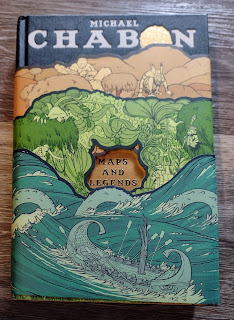Michael Chabon, Maps and Legends
"Those of us who cannot make it from one end of a street to another without being momentarily upended by some fragment of outmoded typography, curve of chrome fender, or whiff of lavender hair oil from the pate of a semiretired neighbor are compelled by the disrepute into which nostalgia has fallen to mourn secretly the passing of a million marvelous quotidian things." (Chabon, p.135)
He's a beautiful writer, Michael Chabon, even when there's no reason to be, and that's such a joy for a reader.
Admittedly, this talent is a distracting joy when he's writing something that's more or less nonfictional, that you should be trying to suss out for validity and whatnot, but distraction is just the price you pay when you get something as lovely as his dadly memoir-ish Manhood for Amateurs or, as is the case here, his essay collection Maps and Legends: Reading and Writing along the Borderlands.
Speaking of distraction, let's begin with the fact that the 2008 hardcover edition from McSweeney's (per the copyright page, "a privately held company with wildly fluctuating resources") is unreasonably, irretrievably beautiful. I mean, can you think of another book that features three separate overlapping dustjackets, each of a different size, with a hole in the centre to reveal the title beneath, framed as if the characters in all three dustjackets are focused on it? And the highly reflective gold embossing on the hardcover itself, including the entire title as a blank space in a gold X (that looks like only a circle until you remove all the dustjackets!), with the capital O in Chabon rendered as a cratered moon, I mean, honestly.Frankly, I love that all this glamour is in the service of what amounts to a collection of highly prejudiced and prejudicial book reviews. Chabon (and Dave Eggers, as the leader of the various McSweeney's enterprise) has as his main project imbuing the act of reading with a sense of excitement, and for me, the book cover was such a fun gambit.
Since publishing The Mysteries of Pittsburgh at 24 (show-off), Chabon has had a very successful career at writing what amount to wildly successful cult favourite novels. None of them work for every reader, but he doesn't care about that, because reading is love, and who loves everybody? At heart, too, he sees himself as a writer of genre fiction, because he quite rightly understands genre to be a late intervention into (or disruption of) creativity and authorship, that was driven almost entirely by the marketing whims and needs of the increasingly monopolistic publishing and bookselling industries.For all kinds of reasons, then, it makes excellent sense that between these covers, you'll find essays about cult-fave comics (Howard Chaykin's American Flagg!, for example) as well as comic mainstays (Will Eisner); essays about genre-fiction success of mainstream writers (in relation to Cormac McCarthy's The Road, which has grown on me enormously in the 17 years since I first read it) and the long love for genre faves (like M.R. James, author of ghost stories like "Oh Whistle, and I'll Come to You, My Lad").
I don't care if you haven't read the works he's talking about, or any of his fiction, because with good writing, understanding isn't the point, or not the only point. If it was, I wouldn't have spent five years, twenty years ago, nearly obsessed with the increasingly inaccurately titled music "reviews" of Glenn McDonald at his blog The War Against Silence.* In fact, I'd even argue that it might be easier to appreciate the writing if you don't know the subject very well, but that's disingenuous at best: rhetoric without knowledge is a dangerous thing, in its habit of driving us toward unreasonable love. Still, cult faves are cult faves precisely because they don't work for everyone, and obviously it's possible to enjoy reading about something you don't yourself enjoy.
The book's last few chapters, as it happens, skew toward Jewishness, and toward Chabon's complicated relationship with this own Jewish heritage. That's an important topic these days, of course, and a ticklish one, even if Chabon wrote these pieces some time ago. There's a great deal more in the book than I want to cover, and I'm so far from understanding faith-related personal histories that I'm absolutely the wrong person to act as guide anyway, but for now I'll say only that I deeply appreciated the delicacy of his doubts and appreciations about Israel, Jewish identity, and Jewish history. Fifteen years on, with Israel's government assiduously blowing up and murdering Palestinians of every description inside and outside Gaza, Chabon's delicacy continues to wear well, and I came away from those essays feeling a bit more knowledgeable, and wiser. Chabon's wife, Ayelet, was arrested in Israel just last month (April 2024) for the crime (!) of trying to deliver food to Gaza, and Chabon's politics about all this have been clear: stop the killing.
The personal effect of this was that I've begun rereading Chabon's novel The Yiddish Policemen's Union, an alternative history about what the world would've been like if Israel had been defeated and destroyed in 1948, leaving the remaining Jewish homeland / nation to be the region surrounding Sitka, Alaska. I loved Chabon's YA baseball-rooted fantasy Summerland (utterly beyond imagining: read it), but The Yiddish Policemen's Union is transformative fiction, or at least that's how I remember it. Reading it while Israel bombs Gaza into bloody shards is making the novel hit differently, but I'll persist.
Long story short: he's a remarkable writer, Michael Chabon, even if he's not for everyone.
* Glenn McDonald and The War Against Silence: After McDonald stopped writing his reviews, eventually he became a data alchemist [!] at Spotify, which included the remarkable side project Every Noise at Once, before Spotify laid him off in December 2023.


Comments